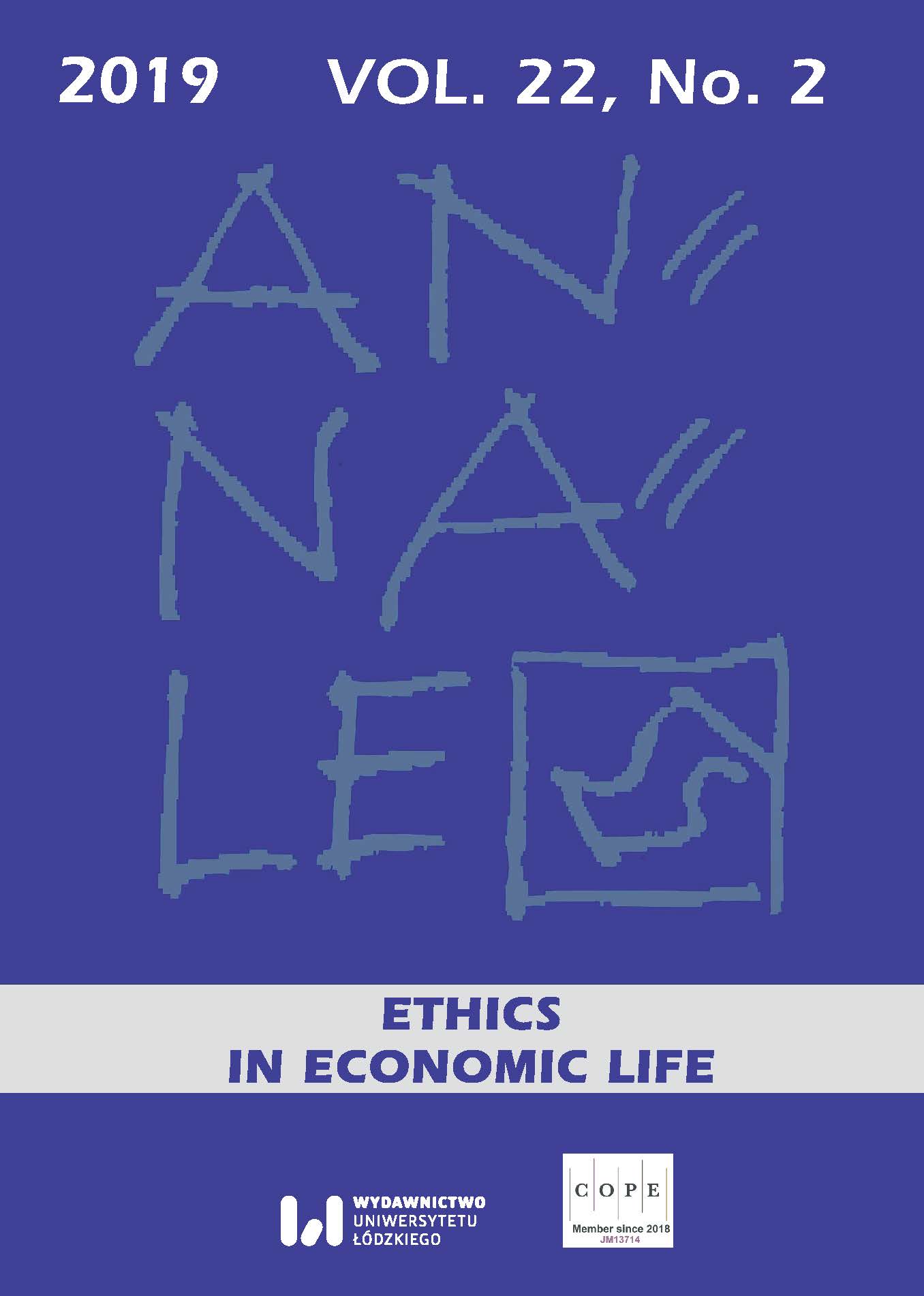The financial morality of Polish consumers
DOI:
https://doi.org/10.18778/1899-2226.22.2.03Keywords:
consent to abuse, financial morality, consumersAbstract
The consent to abuse made by consumers reflects a particular normative order which constitutes part of a socially accepted moral order. It constitutes a specific market regulator because the wide acceptance of unethical behaviours can hinder the functioning of legal and other formal institutions, while the lack of such acceptance can support them and make them more efficient. The paper presents the results of a periodical research project aimed at reconstructing this order in the financial area. The project, entitled “The Financial Morality of Poles”, includes a survey of a group of 1000 Polish adults from the whole country. The survey has been conducted on a yearly basis since 2016. The main result of the project is a map of Poles’ moral permissivism in the area of finance. The map is based on questions the respondents were asked about the level of justification of consumer activities which are illegal or which violate moral norms. Ethical standards for judging consumers’ behaviours vary considerably, from behaviours that are condemned by the overwhelming majority to behaviours deemed justifiable by more than half of the respondents. It was assumed that, based on the results obtained in individual questions, an estimate of consumer reliability on the financial market can be made. This estimate results from averaging the responses which accept the behaviours described in the questions and is defined as the acceptance index for unethical financial behaviours.
References
Atakan, M. G. S., Burnaz, S., & Topcu, Y. I. (2008). An empirical investigation of the ethical perceptions of future managers with a special emphasis on gender—Turkish case. Journal of Business Ethics, 82(3), 573–586.
Google Scholar
Babakus, E., Cornwell, T. B., Mitchell, V. & Schlegelmilch, B. (2004). Reactions to unethical consumer behawior across six countries. Journal of Consumer Marketing, 21(4/5), 254–263.
Google Scholar
CBOS 2013. Wartości i normy. Komunikat z badań. BS/111/2013.
Google Scholar
CBOS 2016. Postawy wobec płacenia podatków. Komunikat z badań 85/2016.
Google Scholar
Cialdini, R. (1994). Wywieranie wpływu na ludzi. Gdańsk: Gdańskie Wydawnictwo Psychologiczne.
Google Scholar
Fisher, J., Fullerton, S., & Woodbine, G. (1999). Today’s ethical perspectives of tomorrow’s business leaders. Irish Marketing Review, 12(2), 48–54.
Google Scholar
Fisher, J., Woodbine, G., & Fullerton, S. (2003). A cross-cultural assessment of attitudes regarding perceived breaches of ethical conduct by both parties in the business/consumer dyad. Journal of Consumer Behavior: An International Review, 2(4), 333–353.
Google Scholar
Frentzel-Zagórska, J., & Zagórski, K. (1992). Prywatyzacja i interwencjonizm państwowy w polskiej opinii publicznej. Studia Socjologiczne, 3–4, 65–87.
Google Scholar
Fullerton, S., Kerch, K. B., & Dodge, H. R. (1996). Consumer ethics: An assessment of individual behavior in the marketplace. Journal of Business Ethics, 15(7), 805–814.
Google Scholar
Fullerton, S., Neale, L. (2010). An assessment of the acceptability of an array of perceived consumer transgressions in the american marketplace. Journal of Leadership, Accountability and Ethics, 8(2), 1–27.
Google Scholar
Gruszewska, E. (2017). Instytucje formalne i nieformalne. Skutki antynomii. Prace Naukowe Uniwersytetu Ekonomicznego we Wrocławiu, 493, 36–50.
Google Scholar
Lewicka-Strzałecka, A. (2006). Moralność ekonomiczna w krajach europejskich. W: H. Domański, A. Ostrowska & P. Sztabiński (red.), W środku Europy, (s. 241–265). Warszawa: Wydawnictwo Instytutu Filozofii i Socjologii Polskiej Akademii Nauk.
Google Scholar
Lewicka-Strzałecka, A. (2016). Moralność finansowa konsumentów jako konstrukt teoretyczny i jego empiryczna reprezentacja na przykładzie polskich konsumentów. Przegląd Socjologiczny, 3, 41–79.
Google Scholar
Lewicka-Strzałecka, A., & Białowolski, P. (2007). Etyka zobowiązań finansowych i stosunek do instytucji upadłości konsumenckiej. W: B. Klimczak & A. Lewicka-Strzałecka (red.), Etyka i ekonomia (s. 87–108). Warszawa: Wydawnictwo Polskiego Towarzystwa Ekonomicznego.
Google Scholar
Lindenmeier, J., Schleer, C., & Pricl, D. (2012). Consumer outrage: Emotional reactions to unethical corporate behavior. Journal of Business Research, 65(9), 1364–1373.
Google Scholar
Meyers-Levy, J., & Loken, B. (2015). Revisiting gender differences: What we know and what lies ahead. Journal of Consumer Psychology, 25(1), 129–149.
Google Scholar
Muncy, J., & Vitell, S. (1992). Consumer ethics: An investigation of the ethical beliefs of the final consumer. Journal of Business Ethics, 24(4), 297–311.
Google Scholar
O’Fallon, M. J., & Butterfield, K. D. (2005). A review of the empirical ethical decision-making literature: 1996–2003. Journal of Business Ethics, 59(4), 375–413.
Google Scholar
Olendzka, H. (2009). Etyka na rynku ubezpieczeń w Polsce z perspektywy Rzecznika Ubezpieczonych, Monitor Ubezpieczeniowy nr 40. https://rf.gov.pl/publikacje/artykuly-pracownikow-i-wspolpracownikow/Halina_Olendzka___Etyka_na_rynku_ubezpieczen_w_Polsce_z_perspektywy_Rzecznika_Ubezpieczonych___Monitor_Ubezpieczeniowy_n__2441
Google Scholar
Ossowska, M. (1970). Normy moralne. Próba systematyzacji. Warszawa: Państwowe Wydawnictwo Naukowe.
Google Scholar
Rawwas, M. Y. A., & Singhapakdi, A. (1998). Do consumers’ ethical beliefs vary with age? A substantiation of Kohlberg’s typology in marketing. Journal of Marketing Theory and Practice, 6(2), 26–38.
Google Scholar
Reiss, M. C., & Mitra, K. (1998). The effects of individual difference factors on the acceptability of ethical and unethical workplace behaviors. Journal of Business Ethics, 17(14), 1581–1593.
Google Scholar
Simga-Mugan, C., Daly, B. A., Onkal, D., & Kavut, L. (2005). The influence of nationality and gender on ethical sensitivity: An application of the issuecontingent model. Journal of Business Ethics, 57(2), 139–159.
Google Scholar
TNS Polska. (2015). Postawy konsumentów wobec produktów finansowych w kontekście tzw. polisoloka, Raport TNS Polska dla Urzędu Ochrony Konkurencji i Konsumentów.
Google Scholar
Tyszka, T., & Sokołowska, J. (1991). Struktura poznawcza i struktura preferencji Polaków w sferze społeczno-ekonomicznej. Studia Socjologiczne, 3–4, 29–50.
Google Scholar
Vitell, S. J., & Muncy, J. (1992). Consumer ethics: An empirical investigation of factors influencing ethical judgments of the final consumer. Journal of Business Ethics, 11(8), 585–597.
Google Scholar
Vitell, S. J., & Muncy, J. (2005). The Muncy-Vitell consumer ethics scale: A modification and application. Journal of Business Ethics, 62(3), 267–275.
Google Scholar
You, D., Maeda, Y., & Bebeau, M. J. (2011). Gender differences in moral sensitivity: A meta-analysis. Ethics and Behavior, 21(4), 263–282.
Google Scholar
Downloads
Published
How to Cite
Issue
Section
License

This work is licensed under a Creative Commons Attribution-NonCommercial-NoDerivatives 4.0 International License.









